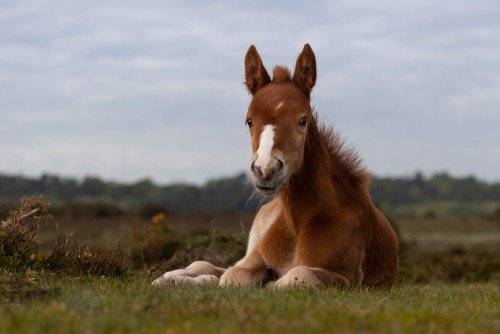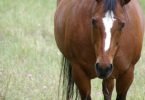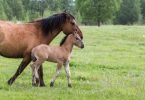Skin layers in every animal are the natural shield to cover all the major organs of the body. In the same way, your horse’s skin represents its workaholic nature, and so it’s essential to take care of their skins. Horse dry skin may not sound like a serious problem to many. However, both internal and external problems can arise due to this condition.
It is often tough to discover all the possible sources of skin dryness in horses. Moreover, if you treat this skin condition without being aware of the exact reason, it can be harmful. That is why, in this article, we have discussed the potential causes and remedies of horse skin dryness.
Causes of horse dry skin
Various factors can cause a horse dry skin. If you think that your horse is having any of these issues, it is time to take some steps.
Lack of essential nutrients
Dietary imbalance and nutrition deficiency are two significant causes of horse skin dullness. Most of the time, physical fitness and skin conditions depend on the quality of diets. However, if the basic diet is not maintained for a prolonged period, it can result in horse dry skin. Additionally, it is necessary to observe if your horse has allergy in any certain food item.
Dehydration
Insufficient water intake also affects skin moisture. If you do not provide the standard amount of water for your animal, it may cause skin dryness.
Dull weather
If your daily surroundings have cold, dry, and dull weather, it can affect your horse’s skin. Excessive exposure to this dry air makes the equine’s skin rough. Daily activities in mud, dust, and in the rain generate extra coating over the skin. Thus, it gradually leads to dandruff and itchiness.
Along with the low-temperature environment, increased heat causes dehydration through sweating. If you continue to let your horse work in this condition, its skin shell will suffer from dry skin.
Improper grooming
If you take your horse out even for a short period, do not forget about cleanliness. If dust and soil pile up on the skin of your horse, it will create dead skin cells and scabs. Thus, it will become a habitat for fungus and dandruff related issues.
Frequent showers
Horse owners often tend to give baths to their horses whenever they find the existence of any dirt. The same thing happens with the sweating horses. Cleanliness does not mean you have to give a shower every time. Horses’ skin produces natural oil for skin protection. Excess contact with water can hamper this process. As a result, the horse’s skin becomes dry and flaky.
Internal health issues
Sometimes, feeble immunity in your horse does not let the body to grow new skin cells. Skin dryness can also happen due to some dental problems and infections inside the equine’s body. Moreover, skin allergies, hormonal imbalance, and parasitic attacks can affect the natural moisture level of the skin.
Bad quality of riding equipment
That is also a matter of concern for your horse’s skin. Equine’s skin comes with the contact of these tools regularly. Therefore, if the fitting of horse tack (Saddles, halters, martingales, stirrups, bridles, etc.) is not up to the mark, skin irritation can happen. Due to scratching and itchiness out of discomfort, skin dryness, or worse symptoms may occur.
To know more about different health problems in horses, check this article “Health Problems in Horses – The Most Comprehensive Account of the Major Health Issues in Horses“.
How to cure horse dry skin
Prevention and solution of horse dry skin
It is simple to prevent regular skin dryness in horses. All you need to do is to avoid the causes of horse dry skin. Here are some tips to prevent the horse skin problem.
Food nutrition
Some food ingredients effectively keep the moisture level of the equines body. Omega-3 fatty acids and essential minerals uphold natural and healthy skin conditions. So, to prevent dry skin problems beforehand, make sure your horse’s meal is balanced and nutritional.
Sufficient water supply
On average, a horse can drink around 5-10 gallons of water daily. It can vary depending on the age, height, and water preference of your equine. However, make sure to provide fresh and cool water for your horse. A hydrated body is the prerequisite of healthy and moisturized skin.
Environment management
Of course, you cannot afford to control the environment condition around you. Still, there are some precautions to save your horse from a rough environment. Horse blankets can give protection from over-drying and cool winds. Entirely cover the equine skin with the special blanket to avoid further horse dry skin signs.
Regular grooming
Your horse is unable to take care of his skin. You have to do this for it. Use some basic grooming tools like grooming gloves, currycomb, brushes (stiff brushes, soft brushes, tail brushes, etc.), and shedding blade. They work efficiently as exfoliating tools. Thus, your grooming session can be successful in removing dead skin cells, dandruff, skin flakes, dust, and hair.
In the case of dandruff occurrence, it is essential to use vet prescribed medicated shampoo and conditioning agents. Do not overdo your horse’s bath.
To avoid the horse dry skin after hair clipping, you can try some grooming oils. Always keep the tools cleaned after use.
Treatment of additional health problems
If your horse is suffering from parasitic or fungal infections or crusty dermatitis, these can lead to an extreme level of skin dryness. Along with this, loss of hair, soreness, itching, swelling, and flakiness can be visible to your horse. Thus, proper treatment of these underlying problems can heal the severity of horse dry skin.
Health check-up
Visit your veterinarian at least once in six months. When the skin of your horse becomes sensitive due to various weather conditions or any other reasons, consult your vet even if everything seems all right.
Food supplements for horse dry skin
Here is a list of essential food nutrients that can ensure a healthy skin coat of your horse.
Food nutrients List | Benefits |
Protein |
|
Vitamin A and biotin |
|
Vitamin B6 (pyridoxine) |
|
Vitamin E |
|
Omega-3 fatty acid |
|
Omega-6 fatty acid |
|
Different brands have different types of vitamin and mineral supplements for horse skincare. However, we recommend Manna Pro Simply Flax for Horses. It is organic and pure ground flaxseed and especially suitable for the dull coat of your horse.
Pros
- Contains a good amount of Omega-3 fatty acid
- Improves skin condition and boosts immunity system
Nevertheless, it is better if you include a balanced diet in your horse’s regular meal. To know more about nutrients for horse skin coat and hoof, watch the video.
Home remedies for horse dry skin
Coconut oil
Undoubtedly, one of the safest and cheapest home remedies for skin dryness is coconut oil. It is enriched with vitamins ( Vitamin C and Vitamin E), lauric acid, and capric acid. These nutrients work magically on horse skin and hair. Also, its antibacterial and anti-fungal elements prevent various skin diseases. Always apply coconut oil on dry and clean skin.
Aloe Vera gel
Have you ever thought of using aloe vera gel to treat your horse skin dryness? Aloe Vera is a wonder plant, which gives soothing and cool relief from skin problems. Special equine aloe vera gels are available at the local pet shops. Try with a small amount of gel first. If there is no irritation, then you can apply gently on the over-dried and flaky body parts. Its anti-inflammatory property and pH-balanced formula can help to revitalize equine skin dryness.
Oatmeal
Whole grain oatmeal is a good way to scrub the dry skin leftovers on your horse. Equine oatmeal shampoo can be a good choice in this aspect. We recommend Ultra Cruz Equine Oatmeal Shampoo for this. Its healing property and natural oil balance formula give relief for itchiness and skin dryness.
Pros
- Enriched with essential vitamins and moisturizers
- Helps to revive the natural pH balance of equine skin
Mineral oils
Packaged moisturizing commodities help a lot to avoid horse dry skin. Sometimes, there can be the presence of harsh chemicals. So, in that case, mineral oil, baby oil, or pure petroleum jelly can be used for skin massaging. Try out these easygoing home remedies. Clean your hands while massaging. In any case of skin irritation, stop using the product. Even for a normal home remedy, ask your vet first.
Conclusion
Horse dry skin is not considered as a serious disease. It may or may not be the symptom of other skin infections and inflammations. Besides, early diagnosis can treat other major equine skin diseases. In comparison to this, you do not even need to put much effort into dealing with your horse’s skin dryness. However, regular veterinarian check-ups and your pet maintenance capability will decrease the possibility of skin dryness in your horse.
To know more about different health problems in senior horses, check this article “Senior Horse Health Problems – Potential Risks, Symptoms, Causes, and Treatment“.






